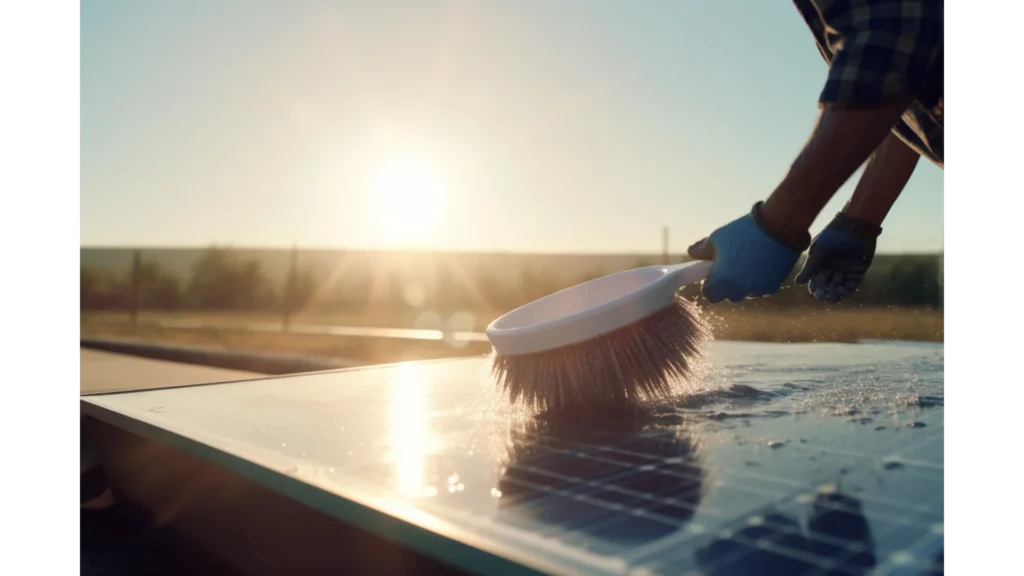
Maintaining and cleaning your solar panels is essential to ensure they perform optimally, last longer, and save you money on electricity bills. Solar energy systems are an excellent investment for homeowners who want to reduce their carbon footprint and benefit from renewable energy. However, proper maintenance is critical to keep them working efficiently and effectively.
Regular inspection, cleaning, and maintenance of solar panels can help identify issues early enough before they escalate into costly repairs or replacements. This article will cover the importance of regular maintenance and cleaning of solar panels, how to prepare for cleaning, the right cleaning solutions to use, and how to monitor your panels’ efficiency after cleaning. We will also discuss when it’s best to seek professional services for solar panel maintenance and share tips on how you can maintain your solar panels properly without breaking a sweat.
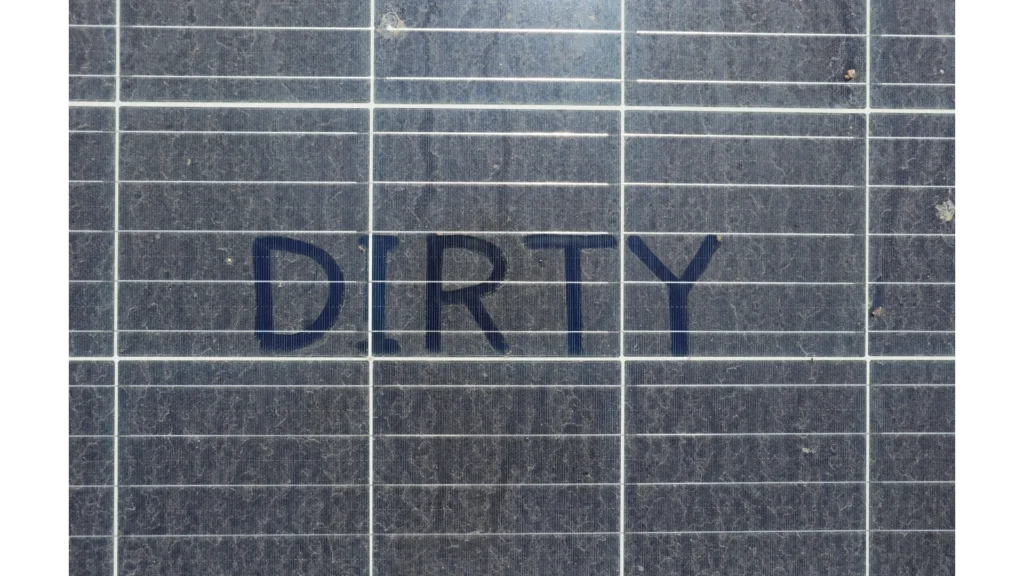
Regular upkeep and cleansing of solar panels play a critical role in ensuring optimal performance and prolonging their lifespan. The benefits of maintaining solar panels are numerous, including improved efficiency, increased energy output, and reduced repair costs. By regularly inspecting and cleaning the panels, you can identify any issues early on and prevent them from turning into larger problems that require costly repairs.
Neglecting regular maintenance can also have significant financial consequences. Dirt, dust, bird droppings, or other debris that accumulate on the surface of solar panels can reduce their effectiveness by blocking sunlight from reaching the cells. This reduces energy production and results in lower savings on electricity bills. Moreover, if left unaddressed for too long, the buildup could damage your panels permanently or shorten their lifespan.
Cleaning solar panels is relatively simple but requires some caution to avoid damaging the delicate components of the system. Before proceeding with cleaning your solar panels yourself or hiring professionals to do it for you, make sure you understand what products to use (and not use), how to clean without scratching or cracking the glass surface of the panel, and how often it needs to be done based on your location’s weather conditions.
In summary, regular maintenance and cleaning are essential for ensuring the maximum efficiency of solar panel systems while minimizing repair costs over time. Neglecting these actions may lead to decreased energy production resulting in lost savings on electricity bills while risking permanent damage or shortened lifespans of your investment in renewable energy technology.
When it comes to maintaining and cleaning your solar panels, referring to the manufacturer’s guidelines is important. These guidelines will provide you with information on how often you should clean and maintain your panels, as well as what products and tools are recommended for use. Following these guidelines can help ensure that your solar panels continue to function efficiently and effectively over time.
Proper upkeep of solar panels includes adhering to a recommended inspection and servicing schedule to ensure optimal performance and longevity. The frequency of cleaning and maintenance depends on various factors such as the location, weather conditions, and dust or debris accumulation level. Generally speaking, solar panels require periodic cleaning every 6-12 months. However, this may vary depending on the environment in which they are installed.
To keep your solar panels in top condition, following an optimal cleaning frequency that aligns with the manufacturer’s guidelines is essential. DIY cleaning techniques, such as using a soft-bristled brush or mild detergent solutions, can be effective in removing dirt or grime buildup without causing damage to the surface of the panel. In addition, regular inspections should also be conducted to identify any signs of damage or degradation that may impact their overall performance. By taking care of your solar panels regularly, you can ensure that they function optimally for many years to come while contributing towards a sustainable future.
To ensure the optimal performance and longevity of solar panels, it is crucial to use recommended cleaning products and tools that effectively remove dirt and grime buildup without causing damage to the panel’s surface. The most common and effective cleaning solution for solar panels is a mixture of water and mild soap or detergent. It is important to avoid using abrasive materials such as harsh chemicals, rough sponges or brushes, as these can scratch or etch the panel’s surface, leading to permanent damage.
Aside from traditional cleaning solutions, eco-friendly alternatives are available in the market. These options include vinegar-based solutions or baking soda mixed with water. They are less harmful to the environment and can be just as effective in removing dirt and debris buildup on solar panels. However, it is important to note that some manufacturers may not recommend alternative cleaning products as they have not been tested on their product lines. Thus, before trying any new cleaning method, it is best to consult with the manufacturer’s guidelines first.
Regular inspection of solar panel systems is crucial for ensuring optimal performance and longevity. By conducting routine inspections, homeowners can identify potential issues before they become major problems that could impact the efficiency of the system or require costly repairs. A thorough inspection should be carried out at least once a year or more frequently if there are concerns about the system’s performance.
Benefits of inspection include identifying any damage to panels, wiring, or mounting hardware caused by weather events such as hailstorms, heavy rainfalls, or strong winds. Inspections can also reveal wear and tear on connectors, cables, and inverters that may need replacement to maintain peak efficiency. Regular inspections can help detect shading from nearby trees or buildings that may have grown since installation and are now impacting panel output.
The importance of maintenance schedules cannot be overstated when it comes to solar panel systems. Clean panels work better than dirty ones. Dust accumulation can reduce the amount of sunlight reaching the panels’ surface, thus reducing their efficiency over time. Scheduling regular cleaning ensures that dirt and debris are removed from the panel’s surface, which helps them function optimally for longer periods.
In addition to physical inspections, monitoring your system’s production levels through an online monitoring tool is also advisable. Monitoring will let you know how much energy your panels produce compared to what they were designed for, allowing you to spot any underperformance issues early on and promptly take corrective measures.
Regularly inspecting your solar panel system, scheduling maintenance tasks like cleaning, and monitoring its overall performance allows you to get the most out of your investment while ensuring its longevity in service delivery.
Regular inspection and maintenance of solar panels are crucial to ensure their optimal performance. As we have already discussed in the previous subtopic, inspecting your solar panels regularly can help you identify any issues that require attention. This section will discuss the next step in maintaining your solar panels – preparing for cleaning.
In summary, proper maintenance is critical to keep your solar panels functioning efficiently for years to come. This includes regular inspections as well as thorough cleaning when needed using proper equipment and safety precautions outlined above. Following these steps will ensure maximum efficiency from your investment in renewable energy without endangering yourself while doing so!
Ensuring optimal solar panel performance requires using the appropriate cleaning solution, which is crucial in maintaining its efficiency and prolonging its lifespan. When selecting a cleaning solution, it is important to consider its chemical composition and environmental impact. The wrong type of cleaning product can cause damage to the panels and may even harm the environment.
There are two options for cleaning solar panels: DIY or professional cleaning. If you opt for a DIY approach, it is essential to choose a mild soap or detergent that does not contain harsh chemicals such as ammonia or alcohol. These chemicals can damage the panel’s glass surface and reduce its effectiveness over time. Additionally, avoid using abrasive materials such as scrub brushes or steel wool pads, as they can scratch the surface.
On the other hand, professional cleaners have access to industry-grade products that are specifically designed for solar panel maintenance. These solutions are typically more effective than household detergents and do not pose any risk to your panels’ structural integrity. Professional cleaners also have specialized equipment that allows them to clean hard-to-reach areas without causing any damage.
It is important to note that regardless of whether you choose DIY or professional cleaning, always prioritize environmental safety by selecting eco-friendly products whenever possible. This will ensure that your solar panel maintains maximum efficiency while minimizing harm to our planet’s delicate ecosystem. In summary, choosing an appropriate cleaning solution is necessary for maintaining the optimal performance of your solar panel system while preserving our environment’s well-being at all times.
When it comes to cleaning your solar panels, there are a few key points to keep in mind. Firstly, it’s important to rinse the panels with water before attempting any cleaning. Secondly, use a soft brush or sponge to gently remove any dirt or debris that may have accumulated on the surface of the panels. Finally, avoid using high-pressure water or abrasive materials as these can cause damage to the delicate surface of the solar panels. By following these simple guidelines, you can ensure that your solar panels remain clean and functioning at their best for years to come.
Maintaining the optimal condition of solar panels necessitates rinsing them with water to eliminate any accumulation of dirt or debris that can hinder their efficiency. Water pressure is a critical factor that needs to be considered when cleaning solar panels. High-pressure water can cause damage or scratches on the surface, reducing the panel’s efficiency. Therefore, it is essential to regulate the water pressure by using a hose nozzle or a low-pressure washer.
The cleaning frequency of solar panels depends on several factors, such as location, weather conditions, and the surrounding environment. If you reside in an area with high precipitation rates, your solar panels may require less frequent cleaning than those located in arid regions. Similarly, if your property is surrounded by trees or other vegetation, you may need to clean your solar panels more often due to falling leaves and debris. By maintaining a regular cleaning schedule for your solar panels and regulating the water pressure during rinsing, you can ensure they operate at maximum capacity and provide long-lasting energy savings for your home or business.
The optimal condition of solar panels may be sustained through the use of a soft brush or sponge, as it can aid in removing any accumulated debris or dirt that might hinder the efficiency of the panel. A soft brush is particularly advantageous when cleaning solar panels because it does not scratch or damage the delicate surface of the panel. Moreover, using a sponge also helps absorb water and detergents used in cleaning.
Effective cleaning techniques involve using gentle strokes with a soft brush to dislodge any dirt and debris that may have accumulated on the solar panel’s surface. It is recommended to start from one corner and work your way across, making sure not to press too hard on the surface while brushing. Additionally, using soap and warm water can help remove stubborn stains without causing damage to your solar panels. By following these simple steps in maintaining your solar panels’ cleanliness, you can enjoy maximum energy production for years to come, ensuring greater energy independence and freedom from high electricity bills.
In order to maintain and clean solar panels, it is important to use appropriate cleaning methods that will not damage the panels and affect their energy production. Using high-pressure water or abrasive materials can cause scratches on the panel’s surface, which may lead to decreased energy output over time. While high-pressure cleaning may seem like a quick and efficient method for removing dirt and debris from solar panels, it can also cause irreversible damage that could impact the performance of the system.
One alternative to high-pressure water or abrasive materials is a soft brush or sponge with mild soap and water. This method is effective in removing dirt and grime without causing any harm to the panel’s surface. Additionally, commercial solar panel cleaning products are available in the market specifically formulated for this purpose. Before choosing a cleaning product, it is important to read the label carefully and ensure that it does not contain any harsh chemicals that could potentially damage the panel’s surface. By avoiding high-pressure water or abrasive materials during the cleaning process, solar panel owners can ensure maximum energy production from their systems while preserving their optimal condition for years to come.
Thoroughly examining solar panels’ condition and removing debris or dirt buildup is essential to ensure optimal functionality and longevity. However, before cleaning your solar panels, preventive measures should be taken to minimize the need for frequent cleaning. This includes placing the panels in a location that receives minimal shade and is not exposed to dust or debris from nearby trees or buildings. Additionally, installing bird guards can prevent birds from leaving droppings on the panels.
When it comes time to clean your solar panels, avoiding high-pressure water or abrasive materials that could damage their delicate surfaces is important. Instead, use a soft cloth or sponge with mild soap and water to gently wipe away dirt and grime. After cleaning, rinse with plain water and dry thoroughly.
After drying your solar panels, inspect them carefully for any signs of damage, such as cracks or scratches. These defects can reduce their efficiency by allowing moisture inside the panel, leading to corrosion over time. If you do notice any damage, contact a professional installer immediately.
In conclusion, maintaining and cleaning your solar panels is crucial for optimal performance and lifespan. By taking preventive measures like minimizing shade exposure and installing bird guards, you can reduce the frequency of cleaning required. When cleaning them, use gentle methods like soap and water while avoiding high-pressure water or abrasive tools that could cause damage. Finally, always inspect your solar panels after washing them for any signs of defects that could impact their function over time.
One potential option for ensuring proper maintenance of solar panels is to enlist the services of a professional cleaning company. While some homeowners may opt for DIY cleaning methods, professional services can offer cost-effective alternatives that provide optimal results. Professional cleaners have access to specialized tools and equipment designed specifically for solar panels, which can ensure thorough and safe cleaning without damaging delicate components.
Professional cleaning companies also have experience in dealing with different types of solar panel designs and materials. This expertise enables them to customize their approach according to the specific requirements of each system, ensuring that the panels are cleaned effectively while minimizing any risks associated with improper handling or the use of harsh chemicals. Additionally, professional cleaners may be able to identify any issues or damage that require attention from trained technicians.
While there are costs associated with hiring a professional cleaner, it is important to consider the long-term benefits, such as improved energy efficiency and the prolonged lifespan of your solar panels. A regular cleaning schedule can help prevent the buildup of dirt and debris that can reduce energy output by up to 25%. By investing in professional cleaning services, homeowners can ensure their solar systems remain functional and efficient for many years.
In summary, while DIY methods may seem like a cost-effective solution for maintaining your solar panels, the benefits provided by professional cleaning services cannot be overlooked. With specialized equipment and expertise in dealing with various types of systems, these professionals offer cost-effective alternatives that provide optimal results. By enlisting their services on a regular basis, homeowners can ensure their solar systems remain clean and efficient for decades into the future.
Efficiency monitoring is a critical aspect of solar panel maintenance that involves regularly inspecting and analyzing the performance data to identify any issues or trends that may affect energy output. By tracking efficiency, you can detect any problems early on and take corrective action before it leads to significant losses in energy production. To monitor your panels’ efficiency, you will need to collect data on factors such as temperature, irradiance levels, shading, and soiling. This information can help you determine if there are any issues that require attention.
Weather impact is another factor that affects the efficiency of solar panels. Extreme weather conditions like heavy snowfall or hailstorms can damage the panels and reduce their ability to generate power. Similarly, high temperatures can cause the panels to overheat and reduce their output capacity. Monitoring your panels during these events can help you identify any damages early on and take prompt action to mitigate them.
Regular maintenance checks should include cleaning your solar panels from time to time. Dirt buildup, bird droppings, or other debris can accumulate on the surface of the panels over time and impact their efficiency. Cleaning them using a soft brush or sponge and a mild detergent solution can help restore their performance level.
In conclusion, monitoring your solar panel’s efficiency is essential to maintaining optimal energy output levels for your home or business’s power needs. Weather impact plays a significant role in determining how well your system performs overall; therefore, regular checks are necessary even when there are no apparent issues with its operation. By incorporating these simple tips into your routine maintenance plan, you’ll be able to keep your system running efficiently for years to come while enjoying clean, renewable energy all year round!
Regular maintenance and cleaning of solar panels is crucial for ensuring their optimal performance and longevity. As discussed, checking the manufacturer’s guidelines and inspecting your solar panels regularly is essential. This will help you identify any potential issues or damage that may require immediate attention.
Using the right cleaning solution and equipment is also important when cleaning your solar panels. Using harsh chemicals or abrasive materials can damage the surface of your panels, reducing their efficiency over time. Additionally, drying and inspecting your panels after cleaning them will ensure that they are functioning properly.
While regular maintenance can be done by most homeowners, professional cleaning services may be necessary for more extensive work. Monitoring your solar panel’s efficiency periodically is recommended to ensure that they are functioning optimally.
In conclusion, maintaining and cleaning your solar panels requires diligence, attention to detail, and adherence to best practices outlined by manufacturers. By following these guidelines and regularly monitoring your system’s efficiency, you can maximize the benefits of clean energy while extending the lifespan of your investment in renewable energy technology.
Regular maintenance and cleaning of solar panels is crucial for ensuring their optimal performance and longevity. As discussed, checking the manufacturer’s guidelines and inspecting your solar panels regularly is essential. This will help you identify any potential issues or damage that may require immediate attention.
Using the right cleaning solution and equipment is also important when cleaning your solar panels. Using harsh chemicals or abrasive materials can damage the surface of your panels, reducing their efficiency over time. Additionally, drying and inspecting your panels after cleaning them will ensure that they are functioning properly.
While regular maintenance can be done by most homeowners, professional cleaning services may be necessary for more extensive work. Monitoring your solar panel’s efficiency periodically is recommended to ensure that they are functioning optimally.
In conclusion, maintaining and cleaning your solar panels requires diligence, attention to detail, and adherence to best practices outlined by manufacturers. By following these guidelines and regularly monitoring your system’s efficiency, you can maximize the benefits of clean energy while extending the lifespan of your investment in renewable energy technology.
When cleaning solar panels, the type of water used can have an impact on their efficiency. Distilled water is often recommended for cleaning solar panels because it lacks minerals and impurities that can leave residue or cause damage over time. Tap water, on the other hand, may contain hard minerals such as calcium and magnesium that can build up on the surface of the panel and reduce its ability to convert sunlight into energy. In areas with particularly hard tap water, it may be necessary to use a specialized cleaning solution or seek out alternative sources of water for cleaning. Ultimately, using distilled water is a safe bet for maintaining optimal performance from solar panels.
The frequency at which solar panels should be professionally cleaned depends on a variety of factors, including the location and environmental conditions in which they are situated. In general, it is recommended that solar panels be inspected and cleaned by a professional at least once per year. However, more frequent cleaning may be necessary if the panels are exposed to particularly harsh or dusty environments. Additionally, if the efficiency of the panels begins to decline noticeably over time, this may indicate that they require cleaning or maintenance. Keeping your solar panels clean and well-maintained is essential for maximizing their energy production and longevity.
When it comes to cleaning solar panels, safety precautions should always be a top priority. Walking on solar panels can potentially damage them and is not recommended. Instead, alternative cleaning methods, such as using a soft-bristled brush or a low-pressure hose can effectively remove dirt and debris without risking any harm to the panels. It is also important to avoid using harsh chemicals or abrasive materials that could scratch or damage the surface of the panels. By taking these safety measures and utilizing alternative cleaning methods, you can maintain the efficiency and longevity of your solar panels while ensuring your own safety.
Regular cleaning of solar panels can provide a multitude of benefits, including an increase in efficiency and power output. Over time, environmental factors such as dust, dirt, pollen, bird droppings, and other debris can accumulate on the surface of solar panels. This accumulation can significantly reduce their ability to absorb sunlight and convert it into usable energy. By removing these contaminants through regular cleaning, solar panel owners can improve their efficiency levels and maximize the amount of power they produce. Additionally, regular cleaning may help prolong the lifespan of solar panels by reducing wear and tear caused by exposure to harsh environmental conditions. Therefore, it is recommended that solar panel owners prioritize regular maintenance and cleaning practices to ensure optimal performance from their investment over the long term.
If you notice damage to your solar panels during the inspection, it is important to assess the severity of the damage and determine whether professional repair options or DIY solutions are necessary. If the damage is minor, such as a small crack or scratch, it may be possible to repair it yourself using a solar panel repair kit. However, if the damage is more significant or affects the performance of your solar panels, it is recommended to seek professional repairs from a certified technician. Attempting to make major repairs without proper knowledge and experience can result in further damage and decreased efficiency of your solar energy system. It’s crucial to prioritize safety and ensure that any repairs made do not compromise the integrity of your solar panels or pose any potential hazards.
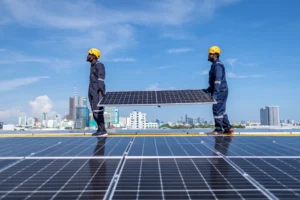
What Are The Most Common Mistakes When Getting A Residential Solar? The most Common Mistakes When Getting A Residential Solar System Solar energy has become
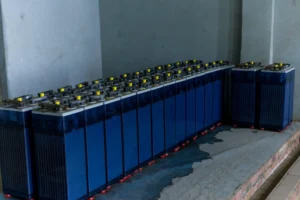
How Do I Maintain The Batteries In My Off-Grid Solar Panel System? Off-grid solar panel systems have become increasingly popular as many people seek to
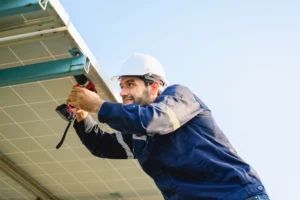
How Do I Ensure My Solar Panel System Is Safe And Meets Building Regulations? As more and more homeowners opt for solar panel systems to

What Are The Most Common Causes Of Damaged Solar Systems? Solar energy is becoming an increasingly popular renewable source for households and businesses. However, solar
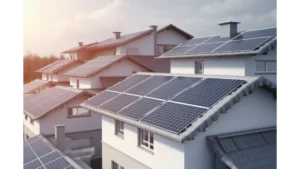
What Warranties Are Available For Residential Solar Panels Homeowners righfully ask “What Warranties Are Available For Residential Solar Panels ?” Residential solar panels are becoming
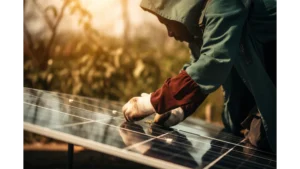
What Kind Of Maintenance Do Solar Panels Require? As solar energy becomes more popular, more and more people are turning to solar panels as a